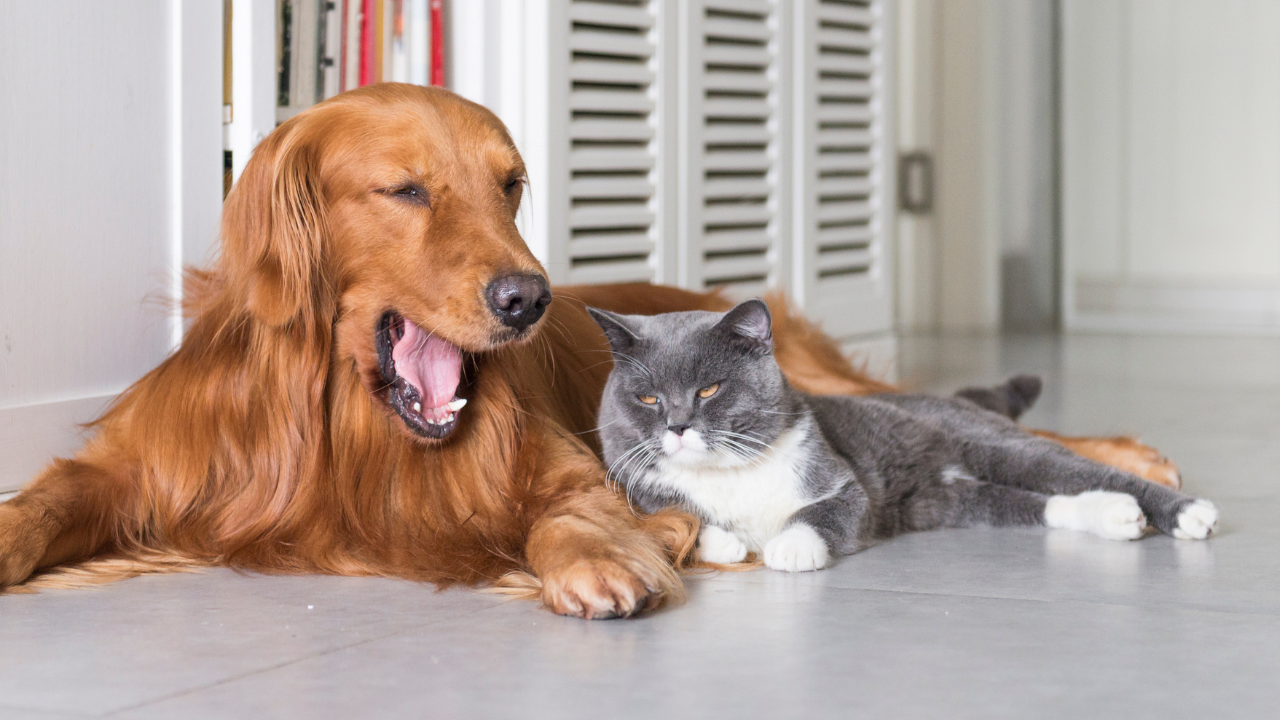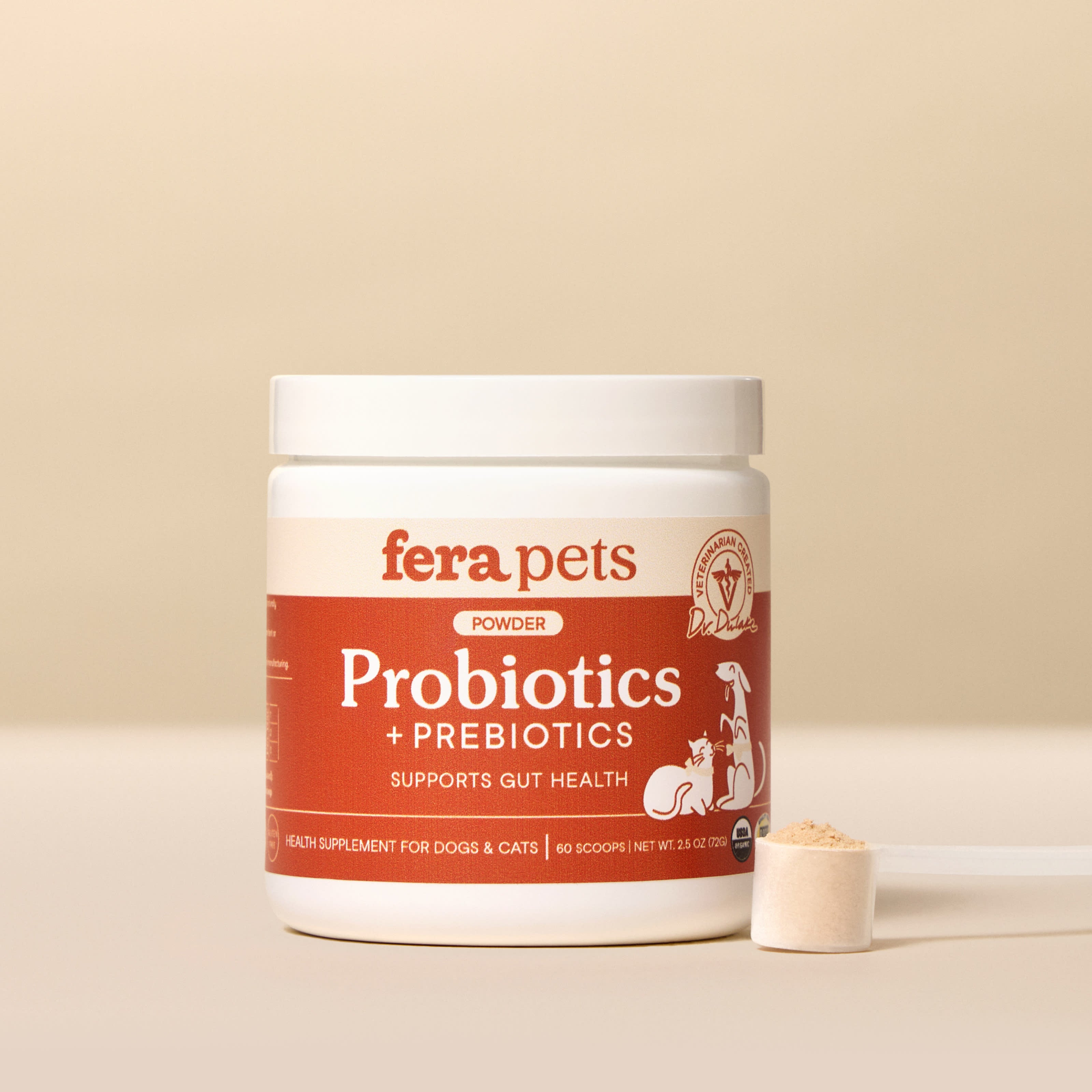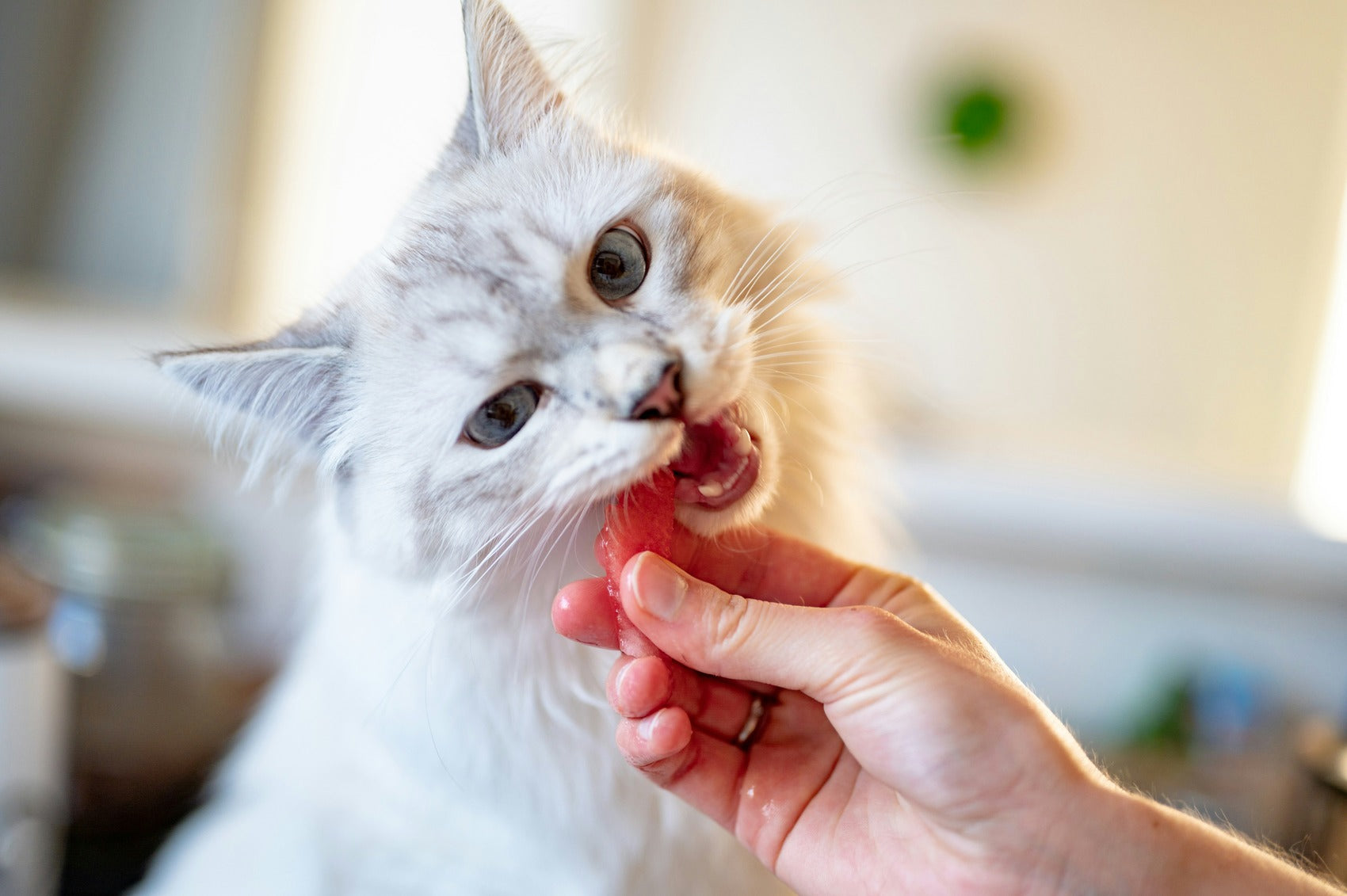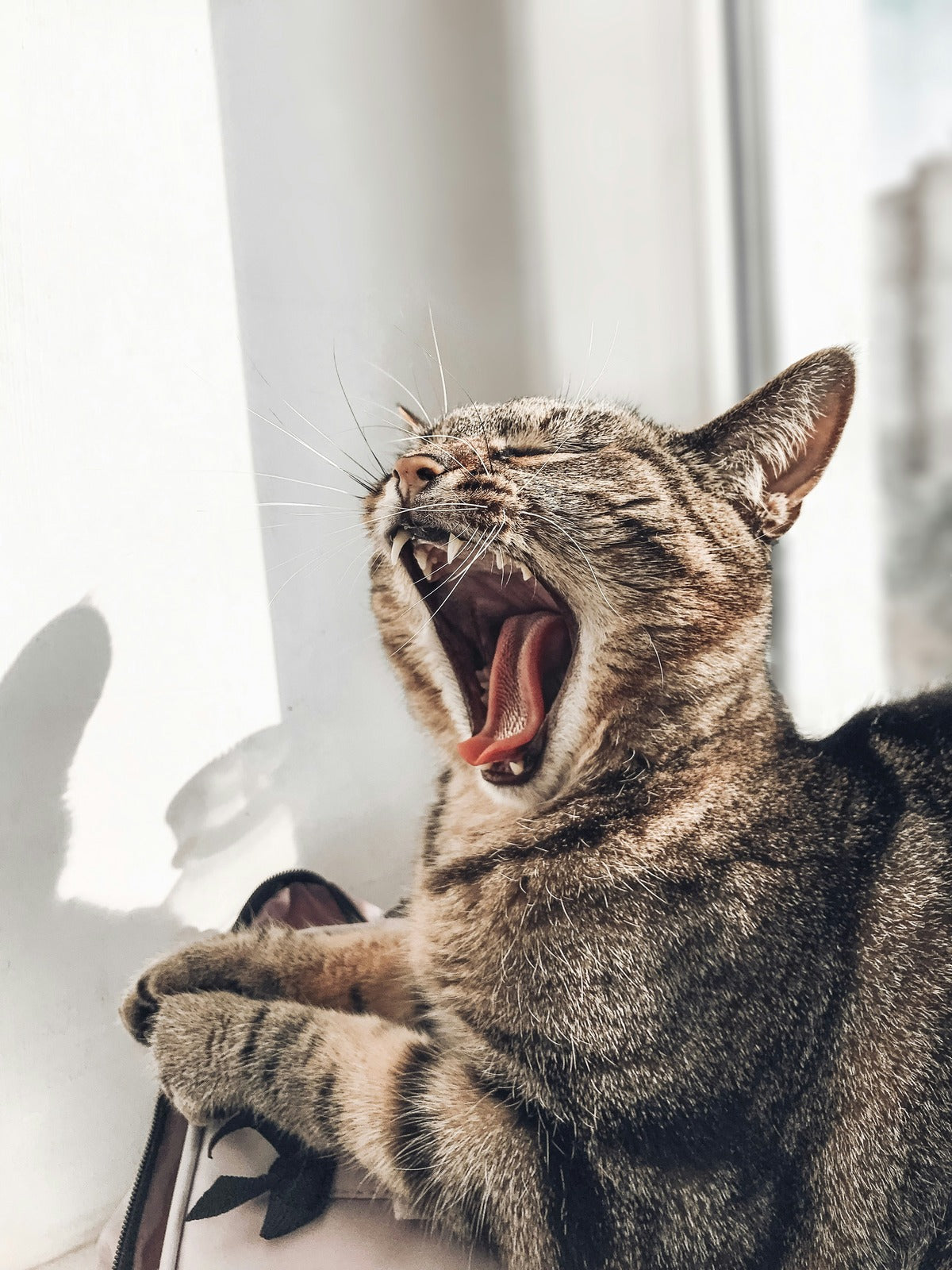Prebiotics and Probiotics for Pets: What You Need to Know
Unlock the secret to your pet's lifelong health and happiness with prebiotics and probiotics. Discover their vital importance, when to use them, and uncover the best choices for your beloved companion. Join us on this transformative journey to gastrointestinal excellence and upgraded well-being.
Your pet’s digestive tract is one of their body’s most important systems. Not only is it responsible for breaking down food and eliminating waste, but it creates and distributes essential nutrients vital to their health and overall well-being.
Maintaining a healthy gastrointestinal tract is one of the best ways to keep your loving companion healthy and happy for years to come, and the use of prebiotics and probiotics for pets is proven for doing just that.
Here is everything you need to know about giving your pets prebiotics and probiotics, when they’re necessary, the best types for your companion, and more.
What are Prebiotics and Probiotics
Your pet’s gut is home to trillions of bacteria, just like yours. This thriving community within the digestive tract is called a microbiome.
The idea of living organisms making themselves at home inside your pet’s body may be unsettling, but it’s actually very natural, healthy, and necessary. You may already know these tiny organisms as probiotics.
These good bacteria keep your pet’s gut healthy by maintaining balance inside the digestive system, sending food through the body, and making fundamental vitamins and nutrients.
However, as with any living thing, these bacteria need sustenance to keep them alive and functioning. That’s where prebiotics come into play!
Prebiotics are a food source for the bacteria living in the gut. When they’re broken down by the probiotics, fatty acids are formed that provide energy for colon cells, help regulate bowel movements, and much more.

When Your Pet Needs Them
The well-being of your pet’s gut is essential for their overall health. If they’re not getting the nutrients they need from their food, it will have negative effects on their immune system, which could quickly lead to illness.
I strongly believe in the effectiveness of prebiotics and probiotics for pets and will recommend them for my patients that have:
- Upset stomach
- Diarrhea
- Bad gas
- Inconsistent or bad poops
- Anxiety
- Poor skin health
- Recently underwent a course of antibiotics
Prebiotics and probiotics are usually recommended when your furry friend is feeling unwell, but they can also be given as an everyday supplement to stay one step ahead of those pesky illnesses.
By incorporating a prebiotic and probiotic supplement into your pet’s everyday intake, you’ll be helping their body maintain a healthy level of gut flora while improving digestion and support of the immune system.
If you believe that your pet could benefit from the use of prebiotics and probiotics, consult with your veterinarian first. In rare cases, these supplements could cause unwanted side effects like vomiting and diarrhea.
A vet will be able to help you decide if prebiotics and probiotics will be beneficial for your pet based on their unique health profile.
Is There a Difference Between Prebiotics and Probiotics for Dogs and Cats?
In short, no. The bacteria found in the digestive systems of dogs and cats are essentially the same, but certain bacteria are more beneficial to certain species than others.
Dogs greatly benefit from Bifidobacterium and Lactobacillus Acidophilus. Strains of Enterococcus and Bifidobacterium are especially good for cats.
Whatever prebiotic or probiotic you decide to give your pet, check the label for the bacteria that will be most advantageous to them.
Most importantly, NEVER give your pet prebiotics and probiotics formulated for humans. Our digestive systems require a different amount of bacteria than those of our pets, and giving them our own supplements may cause stomach upsets.
Types of Prebiotics and Probiotics for Pets
Pet formulated prebiotics and probiotics come in many forms, so you’ll be able to choose the one your pet will enjoy the most.
Supplements can be given in the form of pills, powders, pastes, and even special treats with all the good stuff hidden inside.
Good bacteria can also be found in certain foods that are safe for our pets to consume such as whole grains, lentils, peas, and most fruits and vegetables. If your pet isn’t sensitive to dairy, small amounts of natural, non-flavored yogurt could also be a great option.

What to Look For in Your Pet’s Prebiotic and Probiotic
Your pet deserves the best! While you’re shopping around for your fur baby’s prebiotic and probiotic supplements, here are some important things to keep an eye out for.
Multiple Strains of Probiotics
Each probiotic strain has particular benefits for the microbiome within your pet’s digestive system, so choosing a product that offers multiple strains instead of just one is highly recommended.
Avoid Low-Quality Flavoring
Many prebiotics and probiotics for pets are made with the tasty flavors they love, but this could be disadvantageous.
It’s best to steer clear of flavors made with undefined proteins such as “animal digest.” Instead, look for single ingredient flavor boosters like beef or chicken liver.
Formatting
While there are several forms of prebiotics and probiotics, science shows that some might be better than others.
Soft chews work great for picky pets since they resemble treats, but they often lose potency after the manufacturing process and exposure to air.
Consider using powders that can be mixed into your pet’s food or pills that you can hide within their favorite treats.
Prebiotics and Probiotics Working Together
Since prebiotics require probiotics to perform at their best, choosing a product that includes both is ideal.
That way, you can feel good knowing your four-legged friend is getting everything they need from their prebiotic.
Prebiotics and Probiotics for Pets That I Recommend
As a veterinarian, I was shocked by the low quality of most supplements designed for pets, including prebiotics and probiotics. That’s why I teamed up with my best friend to create one of the best organic prebiotics and probiotics for dogs and cats.
Our USDA Organic Probiotics with Prebiotics come in a flavorless powder form and contain 5 billion CFUs per scoop and 12 live powerful strains of living good bacteria.
They’re also 100% vegan, grain-free, and crafted without soy, corn, dairy, artificial dyes, or preservatives. We’re confident it will help maintain your pet’s proper gut flora while providing a multitude of other benefits such as healthier skin and improved immune response.
Naturally Upgrade Your Pet’s Health With Fera Pet Organics
Unlock your pet's health potential with expert advice from Dr Michelle Dulake! Start making informed decisions today with her cutting-edge insights, backed by years of experience and research. Don't miss out – secure a brighter, healthier future for your furry friend!
Our organic probiotics with prebiotics are just some of the many all-natural supplements we offer for your furry family members. From solutions to your senior pet’s aching joints to skin and coat support, you’ll find just what your pet needs to live a longer and healthier life at your side.
Browse all of our supplements for cats and dogs, and don’t forget to check out our blog for more tips on keeping your pets feeling their best.





